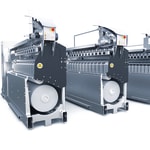
Over 15 million tons of CO2 savings in 20 years - that is the balance sheet of e-save - the sustainability program of today's Oerlikon Polymer Processing Solutions Division. As one of the world's leading suppliers of manmade fiber plant technologies, the company has been developing, producing and launching its products and services with sustainability in mind since 2004: "Energy savings and Efficiency" of systems, machines and components, "Environment" relief and improved "Ergonomics" for optimal machine operation are the four e-save topics that have provided fiber and yarn manufacturers with significant added value in terms of economy, safety and process handling right from the start. The pioneers of today's brands Oerlikon Barmag, Oerlikon Neumag and Oerlikon Nonwoven were already true pioneers in terms of sustainability.
Rising energy prices, scarce resources, an ageing society, a shortage of skilled workers and lower profit margins in many industries prove Oerlikon's e-save mission right. For 20 years, the technology leader in manmade fiber production has been scoring points with significantly lower energy consump-tion compared to the market standard, the competition or its own predecessor models. Fiber and yarn manufacturers around the world appreciate this, as investments in new systems developed according to e-save criteria pay for themselves in a much shorter time. "Topics such as energy efficiency and the careful use of resources have become increasingly important for all our customers in recent years, not least due to stricter legal framework conditions," says Georg Stausberg, CEO of the Oerlikon Polymer Processing Solutions Division. "Our e-save sustainability program and the associated technology development over the last two decades has often given us the decisive advantage in numer-ous investment decisions on the customer side and thus the edge over the competition."
Over 15 million tons of CO2 saved since the introduction of e-save
The Oerlikon Polymer Processing Solutions Division and its business units have been subject to DIN ISO certification for decades, they realize the CE marking and consistently implement the strict guide-lines for machine safety, especially in terms of protecting employees on the customer side. At the beginning of the millennium, however, this was no longer enough. The company and its managers wanted to voluntarily do even more with a view to the future. As a result, the e-save program was launched in 2004.
Since its introduction, hundreds of manmade fiber spinning mills worldwide have been equipped with technology solutions from Oerlikon Barmag, Oerlikon Neumag and Oerlikon Nonwoven. Around half of the currently installed production capacity for polyester, polypropylene and nylon is based on Oerlikon technologies. According to an estimate by the publication "TheFiberYear 2024", this corresponds to almost 40 million tons of fibers and yarn annually. The corresponding CO2 balance is impressive: The e-save certified customer installations saved, cumulatively over the last 20 years, over 15 million tons of CO2. This is roughly equivalent to the emissions generated by around 15 million intercontinental passenger flights per capita, or the amount that a forest with a surface area of 300 km² - roughly the of Munich, Germany - can store.

Efficient heating and cooling creates energy-saving potential
What did the engineers focus on in the beginning? Heat is a crucial factor in polymer spinning sys-tems. Polyester melt is conveyed from the polycondensation plant to the spinning system at temperatures between 280 and 290 degrees Celsius. The hot filament coming out of the spinnerets is then cooled in the quenching unit before being drawn on hot godets, depending on the process.
"All of this has the potential to optimize energy consumption: WINGS POY (Winding Integrated Godet Solution) revolutionized the manmade fiber industry at ITMA 2007. The completely new winding concept already showed the potential to turn the entire industry upside down. All market participants were enthusiastic from day one," says Jochen Adler, CTO of the Oerlikon Polymer Processing Solutions Division. Chinese companies in particular already saw the technology that would make them global pioneers in the manmade fiber industry. Five years later, WINGS FDY conquered the market with even more e-save advantages, especially in the area of energy savings. The Oerlikon Barmag innovation achieved over 40 % lower energy consumption compared to the industry standard at the time. The return on investment (ROI) was and still is achieved very quickly. The best technology with the highest quality is therefore also worthwhile from an economic point of view. In addition to the Oerlikon Barmag core technology WINGS - today an indispensable part of a modern manmade fiber spinning mill - the company has set standards over the years with other components in the field of energy savings.
Benchmark market in the industry
The SP8x spinning head series, for example, is based on a reduced heat-radiating surface with signif-icantly improved insulation, resulting in more than 40 % less heat loss compared to its predecessor models. In concrete figures, this means energy savings of around 200,000 kWh per year for a system with 36 positions. The component therefore remains the benchmark in the industry.
"The EvoQuench radial quenching system is a real cash cow thanks to its up to 80 % lower air conditioning requirement. In combination with the WINGS take-up system, up to 46 % energy and around 50 % waste can be saved compared to conventional technology, depending on the process", so Adler. The latter is mainly due to the ergonomically unique concept of the take-up unit: The component is placed at eye level in record time; only one operator is required.



